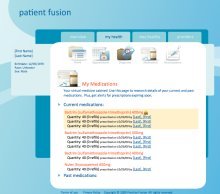Practice Fusion in PHR game


(Shown is part of the new product's medications screen, from PracticeFusion.)
Their base product is ad-supported, so while larger vendors are hustling hospitals for multi-million dollar contracts, Practice Fusion is able to get small practices online for zero dollars. Priceless.
So it is natural Practice Fusion would get into the Personal Health Record (PHR) game.
The difference between an EHR and a PHR is that, while the EHR belongs to the doctor or hospital who creates it, the PHR belongs to you. Also, while disclosure of EHR data is subject to HIPAA rules, you control what is released from your PHR, and to whom.
So PracticeFusion is highlighting Salesforce's annual Dreamforce conference this week with the announcement of PatientFusion.
It's a PHR built and delivered on the same platform as the EHR offering. Multiplying the number of doctors using its service by their rough patient counts PracticeFusion says it is offering this service to 1 million people at launch.
Any PracticeFusion practice, which may be paying nothing for its service, can thus offer a PHR to their patients, who also pay nothing. This is not as large a benefit as what Microsoft HealthVault and Google Health offer, but wait, there's more.
Since the EHR and PHR are in the same cloud, populating your PHR, and managing the permissions needed to keep the data flowing, is easy. Security is also simplified, since once you order your EHR a bunch of data isn't flowing between systems, but within a single cloud.
When PracticeFusion's PR shop pitched this to me, they compared it with Kaiser Permanente's EPIC-based system, myHealth Manager. One can argue that's unfair, since Kaiser spent billions to build a scaled EHR-PHR system early in this decade, while PracticeFusion has been growing its smaller SaaS operation organically.
But if the feature sets are nearly identical, and the delivery mechanisms are similar, how different are they? Time will tell. As more people get PHRs we're going to get into a feature war, with all vendors looking to connect a range of devices and analysis to their offerings.
Should be fun.